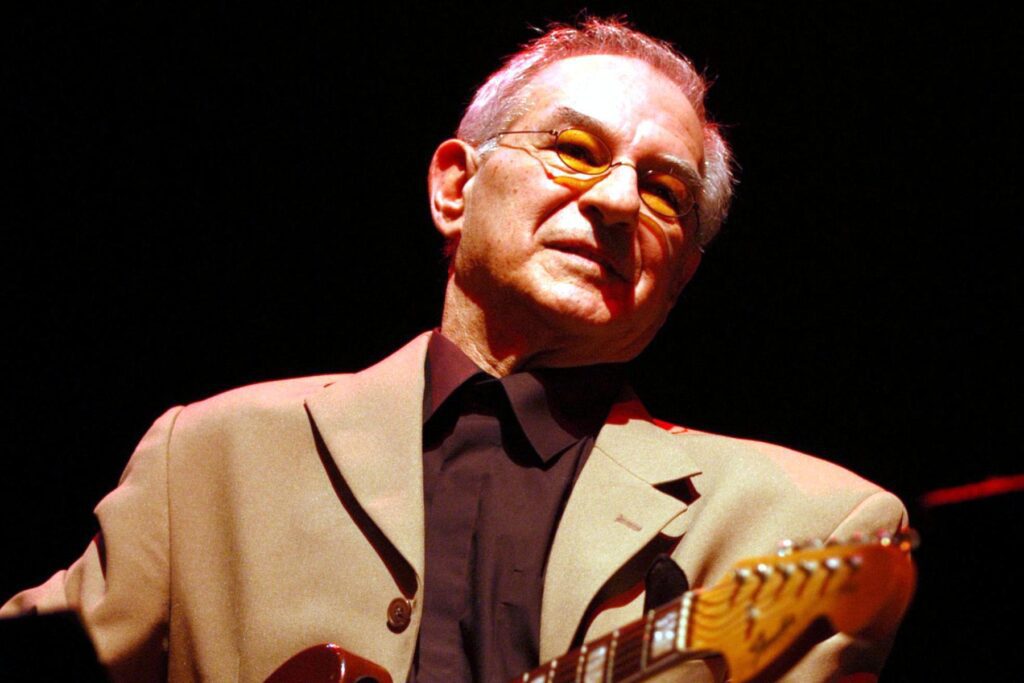
Joe Messina, Funk Brothers Guitarist on Myriad Motown Classics, Dead at 93
Joe Messina, the prolific guitarist whose work with the Funk Brothers can be heard on an array of Motown classics, died Monday, April 4, the Detroit Free Press reports. He was 93.
Messina died at his home in Northville, Michigan after a lengthy battle with kidney disease. Despite his long illness, Messina’s son, Joel, said his father had not only been living on his own up until a month ago, but he was still frequently inviting fellow musicians over to jam.
“As one of the original Funk Brothers, Joe Messina leaves a lasting legacy as one of the creators of the Motown sound,” Robin Terry, CEO and chairwoman of the Motown Museum, told the Free Press. “A powerhouse talent, he was personally recruited by Berry Gordy and made a massive impact during the label’s most formative years. We are thinking of his family and fans, and will continue to celebrate his musical contributions for generations to come.”
Born and raised in Detroit, Messina began his career as a jazz guitarist in his hometown, doing live and studio gigs, commercial work, and appearing regularly on television. He had stints in the house band at ABC television studios in Detroit, while he also played on the popular Detroit-based TV show, The Soupy Sales Show; these gigs gave Messina the chance to play with jazz legends like Charlie Parker, Miles Davis, and Dizzy Gillespie.
Messina was one of several musicians Gordy recruited from the Detroit jazz scene when he launched Motown at the end of the Fifties and needed to put together a house band (he was also one of a handful of white musicians in a group that was radically integrated for its time).
Messina was one of three guitarists the Funk Brothers had on hand during Motown’s heyday — Robert White and Eddie Willis being the other two — and he specialized in giving songs a simple but distinctive rhythmic backbeat. His steady guitar work can be heard augmenting the work of the bass and drums on seminal hits like Martha and the Vandellas’ “Dancing in the Streets,” the Four Tops’ “I Can’t Help Myself (Sugar Pie Honey Bunch)” and the Temptations’ “Ain’t Too Proud to Beg.”
Messina played on records by virtually every major Motown act, from Diana Ross and the Supremes to Smokey Robinson and the Miracles to Stevie Wonder. Additionally, his work is all over what’s arguably the label’s most important release, Marvin Gaye’s 1971 classic, What’s Going On. (On top of all his Motown work, as Billboard notes, Messina pioneered an alternative playing technique known as the Interval Study Method, which made use of diatonic and chromatic scales.)
After over a decade of success with Motown, Messina not only stepped back from the label, but guitar as well, after Gordy moved Motown headquarters from Detroit to Los Angeles in 1972. Messina instead focused on running various local business ventures, caring for his wife, and playing some harmonica as well.
In the early 2000s, Messina and the Funk Brothers did reunite, first around the documentary Standing in the Shadows of Motown, and then for a couple of years on the road together. The Standing in the Shadows of Motown soundtrack earned Messina a Grammy Award in 2003, while two years later the Recording Academy honored the Funk Brothers with a Lifetime Achievement Award.
In a 2005 interview with the Musicians Hall of Fame, Messina reflected on his career as a guitarist in general, and the work he did with Motown. He admitted that when he first joined the Funk Brothers, he figured the gig was just a steady job and steady paycheck. “Of all the jobs I had, I figured would be the least important,” he said. “Of course, it did take care of business… I figured that was my money music. Motown was for fun, it was a job. And it ended up being the good one.”



